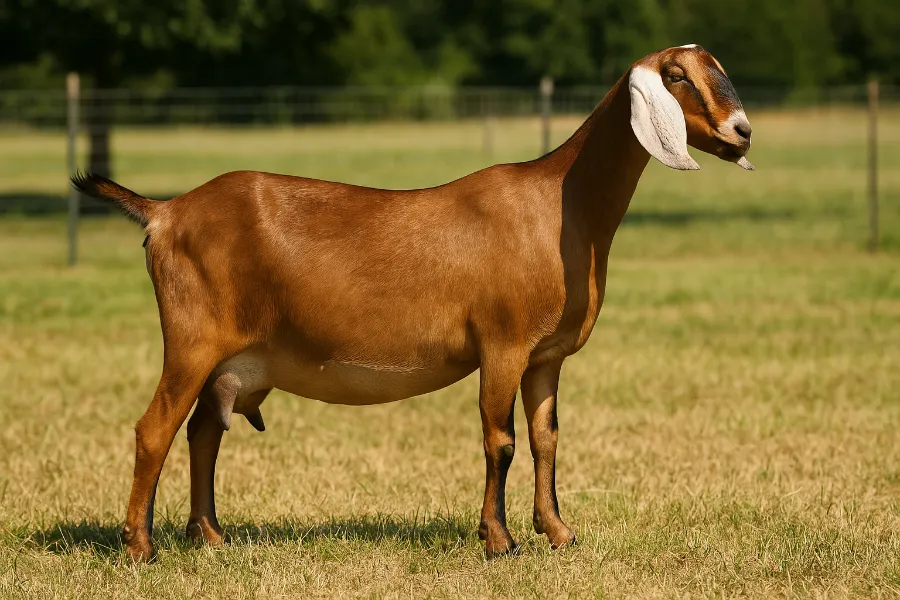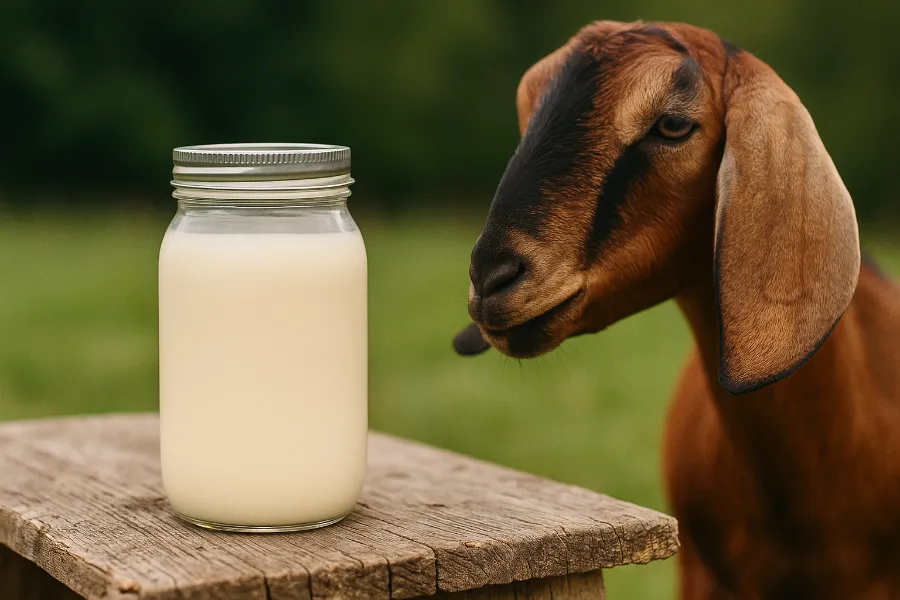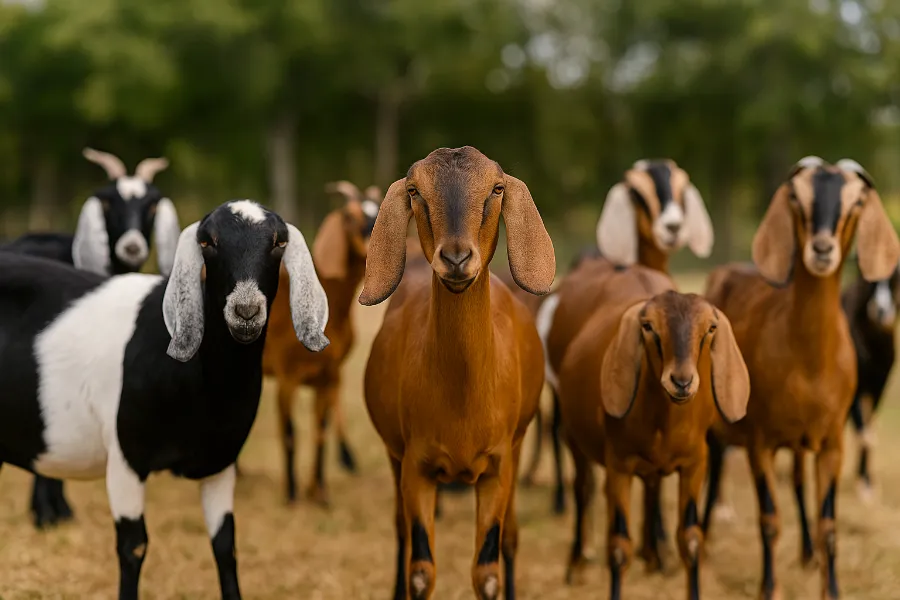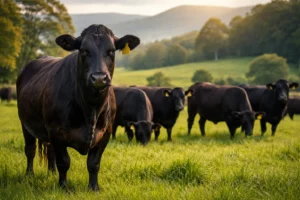When I first started my homestead journey, I knew I wanted animals that could give back every single day. That’s how I fell in love with nubian goats. With their long floppy ears, gentle personalities, and rich, creamy milk, they’ve become a staple in my barnyard and a favorite for anyone looking to raise goats for dairy.
This post is my personal take on raising Nubians—what I’ve learned, what to expect, and why they’re one of the best dairy goat breeds out there.

Nubian Goats Milk: What Makes It Special
The number one reason people bring Nubians into their lives is for nubian goats milk. It’s different from other dairy goats in a few important ways:
- Creamy and rich: The butterfat levels in Nubian milk range from 4% to 5%, which is higher than most breeds. That creaminess makes it perfect for cheese, yogurt, and even homemade ice cream.
- Mild flavor: Nubian milk doesn’t usually have the “goaty” tang that some people dislike. My family drinks it straight from the fridge without hesitation.
- Long lactation: With the right care, Nubian does can provide milk for 8–10 months or more after kidding.
For me, the biggest joy is knowing I can use Nubian goat milk for nearly everything—from morning coffee to mozzarella.
Dairy Goats: Why Nubians Stand Out
When you hear the phrase dairy goats, you probably think of breeds like Saanen, Alpine, or Nigerian Dwarf. Each one has something to offer, but Nubians bring a mix of qualities that really shine on a small homestead.
- They’re heat-tolerant and do well in warmer climates.
- Their milk is richer than high-volume breeds like Saanens.
- They have fun, outgoing personalities that make them more like pets than livestock.
If your goal is quality milk and friendly animals, Nubians tick both boxes.
Dairy Goat Breeds: Comparing Nubians to the Rest
To really understand Nubians, you have to compare them to other dairy goat breeds.
| Breed | Strength | Weakness | How Nubians Compare |
|---|---|---|---|
| Saanen | High milk volume | Lower butterfat | Nubians produce less milk but creamier milk |
| Alpine | Reliable producers | Thinner milk | Nubians offer richer flavor |
| LaMancha | Mild temperament | Moderate butterfat | Nubians bring bolder personalities and creamier milk |
| Nigerian Dwarf | Very high butterfat | Small daily volume | Nubians balance richness with more volume |
That balance of richness and volume is what makes Nubians such a go-to choice.
Goat Milk Production: What to Expect
When it comes to goat milk production, Nubians hold their own. On average:
- A mature doe can produce 1 to 2 gallons a day during peak lactation.
- Over a lactation cycle, you can expect 2,000 pounds of milk or more.
- Production improves as does mature—first-timers (called fresheners) often give less but catch up by their second year.
While they don’t outpace Saanens in sheer volume, the butterfat levels mean their milk is more versatile and valuable for homestead use.
Nubian Dairy Goats: Personality and Temperament
One of the best parts of raising nubian dairy goats is their personalities.
- They’re affectionate and love human attention.
- They’re also vocal—mine will “talk” to me the second I walk outside.
- They’re curious and clever enough to test fencing if they spot a weakness.
Yes, they can be loud, and yes, they’re mischievous, but those traits make them charming. They’re not just milk producers—they’re companions.

Nubian Goat Care: Meeting Daily Needs
Good nubian goat care is what keeps your herd happy and productive. Here’s what works for me:
Shelter
- Dry, draft-free, and well-ventilated barns are a must.
- Each goat should have 15–20 sq. ft indoors and plenty of pasture space outdoors.
- Fresh bedding like straw or shavings keeps them comfortable and clean.
Feeding
- Hay is the foundation—alfalfa is excellent for milkers.
- Grain supplements provide energy during lactation.
- Minerals and salt should always be available free-choice.
- Clean water is critical—lactating does can drink up to 3 gallons a day.
Health
- Hooves trimmed every 4–6 weeks.
- CDT vaccinations for tetanus and enterotoxemia.
- Parasite checks and smart deworming practices.
- Udder checks at every milking to spot mastitis early.
When you give them consistent care, Nubians reward you with steady milk and fewer health problems.
How Much Milk Do Nubian Goats Produce?
So let’s answer the big question: how much milk do Nubian goats produce?
On my farm, I’ve seen:
- 1.5 gallons per day from my top doe during peak lactation.
- 1 gallon per day as a consistent average across the herd.
- Close to 9,000 pounds in a single season from three does combined.
It’s not just the numbers—it’s the quality. That creamy milk goes further in cheese-making than larger quantities of thinner milk from other breeds.

Final Thoughts on Nubian Goats
Raising nubian goats has been one of the most rewarding decisions I’ve made on my homestead. Their milk is rich, their personalities are big, and they truly become part of the family.
If you’re considering dairy goats, Nubians deserve a top spot on your list. They’ll give you quality milk, long lactation periods, and more than a few laughs with their curious, vocal personalities.
For me, Nubians aren’t just a source of dairy—they’re part of the rhythm of daily life. Once you’ve had fresh Nubian goat milk in your coffee or homemade cheese on your table, you’ll understand why this breed has captured the hearts of so many farmers and homesteaders.
FAQs
Nubian goats are famous for their long ears, friendly personalities, and rich, creamy milk with higher butterfat than most dairy breeds.
Nubian goats can produce milk for 8–10 months after kidding, with some does maintaining lactation for even longer with proper care.
On average, Nubian does produce 1–2 gallons of milk per day, depending on genetics, diet, and overall health.
Yes, Nubian goat milk is perfect for cheese because of its high butterfat content, which creates a creamy texture and rich flavor.
Nubians are a great choice for beginners because they’re affectionate and easy to handle, though they can be vocal and clever escape artists.
They thrive on high-quality hay, especially alfalfa, along with grain supplements, minerals, and unlimited fresh water.
They need a dry, draft-free shelter with plenty of ventilation, plus secure fencing since they’re curious and love to test boundaries.













